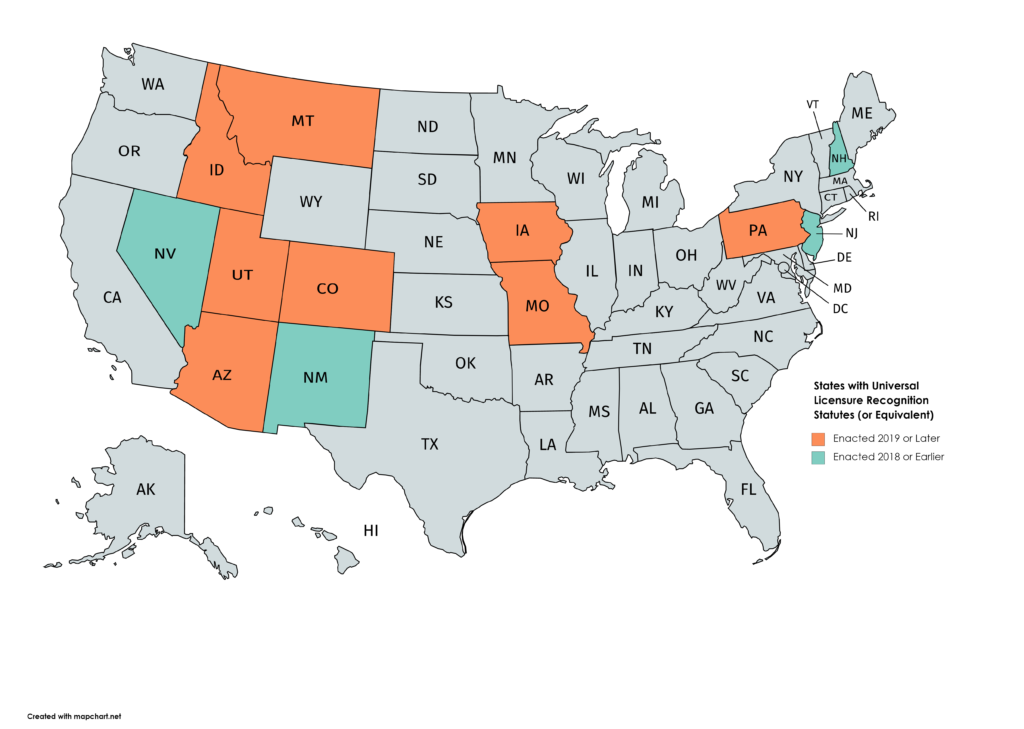As states seek ways to improve occupational licensure portability for out-of-state workers, “universal licensure recognition” laws have gained popularity. Since 2019, eight states have either implemented new or reworked existing license portability policies that may be defined under the universal licensure recognition model. The model generally sets less restrictive and more uniform licensure portability standards across most or all licensed occupations within the state.
While these universal license recognition laws do not provide for “true reciprocity” (instantaneous recognition of another state’s license) and may still require an application process and discretion by the licensing board, they have the intended effect of lowering the threshold for license portability in a state and reducing time to licensure. States also may particularly benefit from the policy’s ability to be enacted unilaterally over a short period of time and the opportunity to set alternative pathways to licensure.
Universal licensure recognition policies are not new. Several states have previously enacted policies allowing for broad licensure recognition for out-of-state workers and more commonly, for military members, veterans and their spouses. However, there has been a renewed effort by states, starting with Arizona and Pennsylvania in 2019, to evolve the construction of these policies under the brand of universal licensure recognition and allow for a wider access to practice than a state’s general policies or statutes may otherwise afford.
The Council of State Governments (CSG) has identified 12 states that have enacted some type of universal recognition policy for out-of-state licensed workers. Because these policies vary in design and scope, CSG has analyzed their similarities and differences to assist states in understanding the specific nature of the policies as states seek to refine their existing licensure rules.
States with Universal Licensure Recognition Policies*

*States that enacted policies in 2018 or earlier may exhibit fewer common characteristics than policies enacted 2019 or later.
Common Universal Licensure Recognition Policy Features
“Shall Clause”
Universal licensure recognition policies stipulate that the proper licensing board/authority “shall” implement the policy or issue a license under the policy, with some exceptions. Twelve states have “shall” clauses in their universal licensure recognition. Nevada and New Hampshire exempt a licensing authoring it there is an existing licensure recognition policy in effect for the occupation in question.
Four states require at least one year of experience.
Three states do not require any minimum amount of experience.
Three states allow the licensing board/authority to determine the minimum experience necessary (if any).
Two states require that an applicant have practiced in the profession within a certain amount of time preceding the date of the application:
New Jersey mandates that an applicant have “practiced in the profession for which licensure in this state is sought, within the five years prior to the date of the application.”
Pennsylvania states that an applicant must “demonstrate competency in the profession or occupation through methods determined by the licensing board or commission, including having completed continuing education or having experience in the profession or occupation for at least two of the five years preceding the date of the application under this section.”
Scope of Practice and Practice Levels
Some states include language mandating the license held by an out-of-state applicant be equivalent in the level of practice and/or scope of practice.
Seven states include scope of practice and/or practice level equivalency requirements. Idaho allows an applicant the ability to receive a limited license if the scope of practice comparison contains additional training requirements.
Five states do not specifically address scope of practice or practice level comparisons
Equal/Substantially Equal Requirement
Seven states stipulate the requirements for licensure in the applicant’s “originating” state license must be equal or substantially equal to the “destination” state’s licensure requirements (i.e. the state with the universal licensure recognition policy). Discretion for what constitutes “equal or substantially equal” may be left to the licensing board/authority.
Additional Required Examination (ARE)
Seven states specifically allow licensing authorities to require additional examination (such as a jurisprudence exam) before a license is granted.
Applicable Occupations/Professions
Six states apply universal licensure recognition policies to all licensed occupations/professions, while six others make the policy specific to a certain authorizing title and/or exempt certain occupations.
Ten states exempt reciprocity agreements and/or interstate compacts.
Two states do not have language in their policies which specifically exempts reciprocity agreements and interstate compacts.
Residency Requirement
Two states specifically require that an out-of-state licensee establish residence in the new state to receive licensure.
Universal Licensure Recognition Policy Comparison Chart
| State | Year | Bill/Statute | “Shall” Clause | Minimum Experience | SOP*/Practice Level | Equal/Similar Requirements | ARE* | Applicable Professions | Exemptions | Residency |
| AZ | 2019 | HB 2569 | Yes | 1 year | Practice Level Equivalency | No | Yes | Title specific, with exemptions |
Yes | Yes |
| CO | 2020 | HB 20-1326 | Yes | Other2 | N/A | Yes | Yes | Title specific, with exemptions |
Yes | No |
| ID | 2020 | SB 1351 | Yes | Other2 | SOP Equivalency3 | No | Yes | All licensed occupations | Yes | No |
| IA | 2020 | HF 2627 | Yes | 1 year | SOP Equivalency | No | Yes | All licensed occupations, with exceptions |
Yes | Yes |
| MO | 2020 | HB 2046 | Yes | 1 year | Practice Level Equivalency | No | Yes | All licensed occupations | Yes | No |
| MT | 2019 | HB 0105 | Yes | N/A | N/A | Yes | No | Title specific | Yes | No |
| NV | 2017 | SB 69 | Yes1 | Other2 | N/A | Yes | Yes | All licensed occupations | Yes | No |
| NH | 2018 | SB 334 | Yes1 | N/A | SOP Equivalency | Yes | No | All licensed occupations | Yes | No |
| NJ | 2013 | AB 1545 | Yes | Other2 | SOP Equivalency | Yes4 | Yes | Title specific, with exemptions |
No | No |
| NM | 2016 | SB 105 | Yes | N/A | N/A | Yes | No | All licensed occupations | No | No |
| PA | 2019 | HB 1172 | Yes | Other2 | N/A | Yes4 | No | All licensed occupations | Yes | No |
| UT | 2020 | SB 23 | Yes | 1 year | SOP Equivalency | No | No | Title specific | Yes | No |
*SOP (Scope of Practice); ARE (Additional Required Examination)
1 May include some exceptions
2 Policy includes some other criteria for experience or is determined by the individual licensing authority/board
3 Limited license available
4 Additional pathways to licensure recognition available

